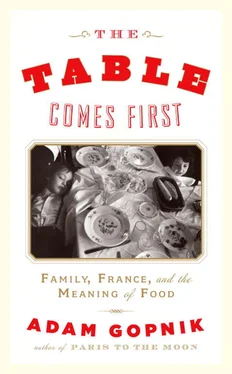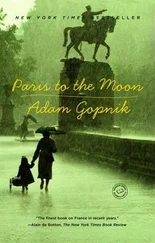Still, I take this to heart. My great-grandparents moved around town, as it happens, but we ended up on Locust Street—just a few blocks away from Chestnut and right by Walnut, and I spent my quite “assimilated” but still distinctly literary-Jewish-intellectual boyhood riding and racing on Spruce and Pine. So I felt, reading these words by you, as blue and betrayed as if I had found my wife in flagrante with another man—and a young, blond SS officer at that. And I have since discovered, what is harder to accept, that this was not a passing bigotry in an otherwise openminded life, but a recurrent theme of yours: your husband, Joseph Pennell, in particular, was an obsessed anti-Semite in a time not short on them, who wrote and illustrated a long book about the hideousness of Russian Jews, serialized, bizarrely, in The Pall Mall Gazette .
We have, of course, been here before. My beloved Chesterton had a true program (a word that sits in sinister poise with “pogrom”) for Jewish expulsion from England. With an effort of will, one can see, if not sympathize with, the shock of Old Americans at the newcomers—a prejudice not entirely unknown to the Jews who, having been here for a century, now see their “own” neighborhoods and landmarks disappear under the pressure of Muslims and West Indians. But there it is. You hate my kind, in the place where my kind went, in exactly the street where not just my kind but my family lived.
Can we eat in peace knowing you despised my grandparents? Must I put a stopper on our relations? Should I end these e-mails, this imaginary conversation? One part of me thinks I should: the only meal I truly regret in my life was a tray of hors d’oeuvres passed around at (the very elderly and deaf) Diana Mitford’s place when she came back to an apartment in Paris from her long life with Oswald Mosley in Versailles. I plead ignorance—her children were lovely people, and my friends, and I did not know then just how Hitlerite she had been, or I would have stayed away. One of the strange sad truths about the gastronomic tradition since Grimod is that good food writing has always bent right, and often toward the extreme right. One had already gone through this pain with Robert Courtine, the great food writer of Le Monde , when it was revealed after his death that he was not merely an anti-Semite but an active collaborationist—and that this might have been so, must have been so, one sees retrospectively in the contempt for all but France and anything but French cooking that runs through his work.
In a way, a bitter way, I should be grateful for this discovery, for it raises the central point of these pages, the key issue, the one big thing too easily avoided: how much can the table truly reconcile—how sweetly can, or should, the rituals of social life reconcile us to our opposites? It is sentimental, surely, to pretend that the ugliness of life escapes the table; we rightly condemn the French intellectuals and artists who made too easy a social peace with their occupiers. But is it unrealistic to wish that some reconciliation of opposites might yet take place there? It’s a hope, at least. Very different people do dine together, or try to. We think about Dr. Johnson, greatest of religious conservatives, reconciled over a good dinner in 1776 with John Wilkes, greatest of libertine libertarians, through the good offices of James Boswell, and we recognize that some of the sanity of British political life, compared with French, is owed to such primal acts of sociability. We can’t wish away differences, but we can hope for an end to hostilities. Disdain for others is part of life; learning to dissimulate it through manners is as good a cure as we can hope for. While we wait for the reign of Universal Love, we can at least share the premise of the Common Table.
After all, the good angel I have on my other hand, Jacques Decour—whose letter began this book—was, for all his heroism, a committed and unrepentant communist, which means, in plain French, a Stalinist, albeit one of enormous courage and humanity. And now, on my other, an anti-Semite… upend the table or keep it set and hope for pleasure to uplift our hearts? We write glossily of the continuities of the table, but this is the perpetual fragility of its concord, which breaks on bigotries and false beliefs that can’t be wished away.
But that they can’t be wished away doesn’t mean that they might not yet be reconciled. Good things do happen when people sit down for dinner. That’s itself a faith. Obviously, we don’t want to sit down to dinner with Nazis, and we rightly condemn those French artists who did. But we do want to sit down to dinner with people before they become Nazis, if it might help keep them from becoming so. It is not wrong to hope that the revelation of a common human touch, a common taste, shared and relished, can become itself an argument for humanity. We disapprove, and rightly, of those who sat down with their occupiers, but we smile, and often, at the countless travelers’ tales of violence averted by bread and salt and beer.
The answer, I think, is that there isn’t one. We try to reconcile as many kinds as we can, and when we can’t, we can’t. We tolerate all that’s tolerable, eat with whom we can, draw lines as we have to, accept as much as we’re able. Liberal tolerance is an injunction urging efforts, not an instruction manual making rules. It says, Do your best with as many as you can until the very last moment when you can’t anymore. And how will you know when you can’t? Why, by the feeling in your stomach.
…behold the mutually hostile
Mouth and eyes of a sinner married
At the first bite by a smile.
So I quoted Auden, back at the beginning of this book, in the epigraph I intended only as a benediction. Now, under the pressure of finding out some more of who you really were, or thought, Mrs. Pennell, I think harder, and now I’m inclined to believe that Auden thought the mouth and eyes were hostile because the mouth always seeks pleasure and the eyes always make judgments. Reconciling the two, our molars and our morals, is what a great meal does—but it can only do it for a moment. Then we are back in the real world of mixed emotions and dubious alliances, where those who share our pleasures are rarely those who please our minds. Brillat-Savarin, whom you called the Master, thought that the rituals of the French table were soft power for decent liberals like himself, but though soft power is power it is still always soft. Would you have taken the trouble, seen a wiser way, with better company and a larger view? I don’t know. But, having summoned you back to life I am surely allowed to hope you would have. I wish I could have tried.
Wild salmon, broccoli, and brown rice. Delicious without being indulgent, good to eat while having some tang of austerity, of firm assertion, about it, I shall make this meal tonight. Cleansing, somehow. A kosher meal, come to think of it!—though, given your obsessions, this is a thought that probably occurred to you before it occurred to me. Come over in spirit and I will cook you all of these things. Salmon, and broccoli purée and perhaps lentils and brown rice, the simple penitent foods. I cannot exactly forgive you. But I can still feed you. Four minutes on one side, three on the other. Salmon should be done in a cast-iron pan. Broccoli is best steamed for eight minutes. Brown rice just takes time.
A Gopnik, of Locust Street
JUST A YEAR AGO, I gave up sweets. I was in a restaurant in San Francisco, and, for the first time that I can recall, when the waiter said, “Dessert?,” in that conspiratorial, perky way they have, I said… nothing. And then the next night, at another place, I did it again.
Читать дальше












